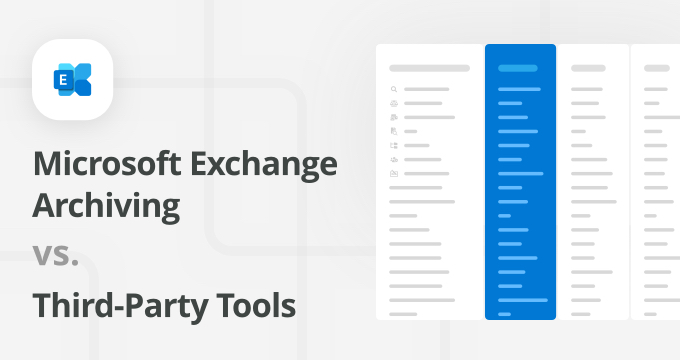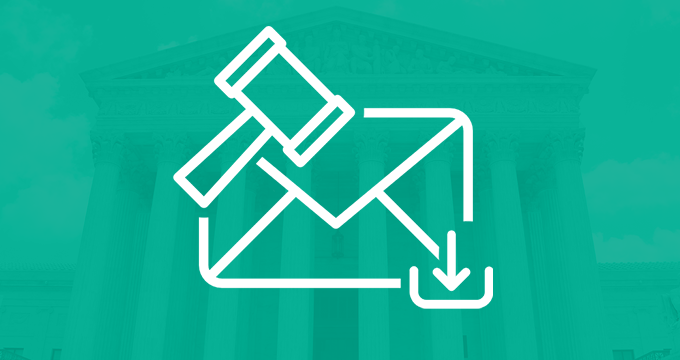We live in a world governed by compliance laws and legislations that span all regulated industries, including K-12 education.
Understanding these laws is one of the key aspects of keeping your school district compliant and away from potential fines, as well as keeping your students’ information private.
The most important law you need to be aware of is FERPA and how it affects your email compliance strategy.
In this article, we are exploring:
- What is FERPA email compliance?
- Why email archiving is important in K-12 education
- More major compliance laws you need to consider.
- How to ensure email compliance under FERPA.
Let’s get started by understanding FERPA email communication.
What Is FERPA?
The Family Educational Rights and Privacy Act (FERPA) is a United States federal law that gives parents access to their children’s educational records and the right to have control over the disclosure of their personally identifiable information (PII).
This right transfers from the parents to the students (“eligible students”) after they turn 18, or enter a postsecondary institution at any age. Before this, access to their education records requires parental consent.
FERPA applies to all K-12 educational institutions that receive federal funds, including elementary and secondary schools, as well as colleges and universities.
| Check your school’s FERPA Compliance status in under 10 minutes |
The Effect of FERPA on Email Compliance
FERPA has significant implications when it comes to email compliance in K-12 educational institutions.
Since it gives both students and parents control over the disclosure of personal information, it’s crucial to adhere to strict FERPA email regulations when developing your email compliance strategy.
Email that gets sent in and out of your school district usually contains sensitive information about your students like their personal information, grades, or attendance records.
Districts must ensure their email communications are secure and that their students’ privacy is protected.
Here’s what you need to consider regarding FERPA and its effects on your email compliance:
- Safeguarding sensitive information — You need to implement robust security measures to secure sensitive student information sent through email without the ability for it to be used for malicious purposes.
- Parental control — There needs to be a secure authentication process to ensure only authorized individuals can access certain data, in this case, parents can only access their child’s data.
- Consent requirements — You must set up a system that only allows disclosure of data that has previously gotten consent from the student or parent.
- Communication policies — Schools need to craft email communication policies that align with FERPA requirements. These policies should outline the permissible use of email for educational records, emphasizing the importance of privacy and compliance.
- Incident response systems — Create a strategy for addressing potential breaches and disclosure of data that wasn’t consented to by notifying the affected individuals and restructuring your security systems.
Now that you understand how FERPA impacts you, let’s talk about email archiving and why it’s important to keep your institution compliant.
The Importance of Email Archiving in K-12 Education
Email archiving plays a crucial role in maintaining compliance with FERPA email communication regulations and ensuring the security and privacy of students’ educational records.
With email being the main communication channel in schools, there’s a lot of sensitive information being transmitted and all of that data needs to be captured and preserved in a secure and organized manner.
From the compliance perspective, any breach of regulations can have serious consequences for the educational institution, including fines, penalties, and reputation damage.
Email archiving solutions are designed to capture, store, and manage the district’s email data and ensure it is retained for periods outlined by FERPA and other retention laws.
There are three key reasons for your school to adopt an archiving solution:
Security of sensitive information
As mentioned above, school data like student records is often sensitive information and it needs to be retained securely.
Email archiving solutions allow you to automatically store all incoming and outgoing content of email messages in a separate database, meaning no potential breach can expose them.
These messages are also encrypted with state-of-the-art technology so that they can’t be decoded and used maliciously.
They also prevent unauthorized access by allowing you to create different roles in your compliance and communication management teams and limiting everyone else’s access to your archive which puts another layer of security on your communication records.
Another clear benefit is that the entire process can be fully automated.
Streamlined ediscovery and open data requests
As most school communication happens through email, email archiving ensures the accessibility of these records.
Access is the key issue here. Within the ediscovery process, schools are required to disclose electronic information early in the proceedings.
But the need for early disclosure isn’t the only requirement when it comes to email records.
Another one is the form email evidence takes — electronic evidence must be provided in its original form since any changes raise the potential for accusations of evidence tampering.
Email archiving prevents this in two ways:
- It ensures that all records are not only stored safely, but also made easily searchable with filters, keyword lists, and labels.
- It makes sure the original message or thread is stored in its native, WORM format, that it is time and date-stamped, and that it can’t be altered or deleted.
Reduced legal and resource costs
The costs associated with email communication may not always be on our minds but think about the fact that you need to retain all of your email communications for at least 7 years.
All of that data can overload our email servers (unless we pay for more storage and processing power).
There are also legal issues and costs in play. Not handling email archiving the right way or slipping up with one regulation could cost your school district millions of dollars in legal fees and fines.
However, archiving email solves both problems by automatically sorting your email communication and making it accessible to search, relieving you of any legal worries.
At the same time, its cloud storage capabilities mean that all email content is stored on a separate cloud server, leaving you with a fast-running email server of your own.
Most Common FERPA Violation Examples
With the amount of data your school needs to archive and the ways you need to adapt your data protection strategy, it isn’t uncommon to violate FERPA.
Some of the most common FERPA violation examples include:
- Failure to inform parents of FERPA rights — Schools may have the best FERPA compliance systems in place, but forget to inform the student’s parents about their rights to access education records and share data with consent.
- Improper security measures — Most consider their data safe if it is archived and forget to implement other security measures like physical data protection, data access limitations, and advanced encryption.
- Sharing educational records without consent — The most common way to violate FERPA. It usually happens unintentionally either by accident, not thinking certain data falls under FERPA laws, or not being educated about FERPA privacy laws.
Out of these three ways schools can violate FERPA, the third can happen to anyone, even the most informed teachers and IT administrators.
Here are four examples of FERPA violations due to sharing records without consent:
- Accidental group emails — Most emails containing records follow the same structure and are copied and pasted, however, if the sender forgets to exclude the previous recipients from the CC, the email might unintentionally be sent to people not meant to receive it.
- Letters of recommendation — Sending a letter of recommendation from a teacher from one school to another registry would need consent from the parents as it is considered a student record under 34 CFR § 99.31.
- Student absence explanation — Publicly disclosing why a student is absent falls under FERPA laws as the teacher would be delving into private information. This sort of FERPA violation might happen in a casual conversation.
- Publicly posting grades — Displaying student’s grades for everyone to see can reveal crucial information like their security number or academic performance which is considered private information. Be that on paper, verbal, or through digital channels, student’s grades are for their eyes only.
Three More Major K-12 Email Compliance Laws to Consider
Although FERPA is the most important law to keep in mind when creating a strategy for your school, it isn’t the only one because K-12 education is regulated by very strict compliance regulations.
That’s because schools fall under several different categories and you need to adhere to all of their specific laws.
What follows is a list of the relevant regulations that govern the retention, storage, and accessibility of all digital communications in the education industry:
The Freedom of Information Act (FOIA) and State Sunshine Laws
According to FOIA, public schools, colleges, universities, and other government agencies must make all records available, including those in electronic format (email, chat apps, social media).
Sunshine Laws are state-specific laws that are very similar to FOIA and that govern the deadlines for the school to produce the requested information.
Similar laws have been enacted worldwide. In Canada, for instance, there’s the Freedom of Information Protection and Privacy Act (FIPPA).
As schools inevitably collect a lot of personal and health information, this law makes them responsible for “ensuring compliance with all access to information and protection of privacy requirements”.
| Related: What You Need To Know About FOIA Management Software |
The Health Insurance Portability and Accountability Act (HIPAA)
Although HIPAA regulates the way healthcare workers handle protected health information and medical records, we now have Medicare on school campuses.
Schools often provide services such as counseling, vaccination, or administration of prescription drugs. This means that schools that possess sensitive health information must ensure full compliance with HIPAA.
| Related: Everything You Need to Know About HIPAA Email Compliance |
Gramm-Leach Bliley (GLBA)
GLBA is the federal act that regulates the security and privacy of personal financial information, which many educators believe is limited solely to financial institutions.
However, if a school district is issuing loans to students or provides financial counseling to donors, it may be considered a financial institution.
The process is much more straightforward in higher education, as colleges and universities regularly engage in lending and providing financial advisory services.
When it comes to K-12 schools, it is necessary to conduct assessments to evaluate whether their activities fall under GLBA. Still, all schools are required to make sure that their student’s financial aid records and all other sensitive information are kept secure and confidential.
How to Ensure FERPA Email Compliance
Conduct an assessment
The first step towards full compliance is to conduct an assessment to understand which specific regulations apply to you.
Familiarize yourself with FERPA and other regulations to gain a comprehensive understanding of the requirements related to your school and how you will need to change your archiving and compliance strategy to abide by them.
This first stage is the most demanding and time-consuming, but it’s worth the effort as it will save you time, resources, and troubles in the long run. Don’t hesitate to hire a legal expert to decipher the laws and regulations for you.
Create records retention policies
Make sure you have rock-solid policies and procedures on which data you are capturing, how it is archived, and for how long it will be archived.
Train and educate your staff to make sure they understand your compliance and information governance programs, as well as the risks and severe consequences of non-compliance. Then have them educate the students.
Provide strict guidelines and enforce the policy. Define what’s acceptable on your official email and assign a compliance officer to monitor and control how technology is used on school grounds.
Conduct internal audits
It’s not enough to build your compliance policy and put it into action as laws can change and you can think of everything in advance.
That’s why it’s very important to conduct regular internal audits that will help you identify areas of risk and allow you to take steps to neutralize or minimize this risk before it becomes a real threat.
Coordinate your various departments to improve your information governance strategy and learn to always be prepared for litigation.
Get an email archiving solution
No compliance strategy is complete without technology. Managing electronic information can be demanding, especially when you deal with somebody’s entire education history and thousands of student records.
Secure, long-term data storage and easy data availability are mandatory for both compliance and legal use cases.
But you can’t do it by hand as there’s just too much data to keep track of.
The main purpose of email archiving solutions is to automate compliance, data management, and ediscovery of email communications.
Cloud-based email archiving systems automatically capture and store all of your email communication, allowing you to search entire databases of communication from a single interface.
Once captured, your email, attachments, and all the metadata are indexed, made searchable, and stored in a WORM format for however long you need them (typically 7 years to be compliant with all relevant regulations).
You can specify different retention windows based on the relevant regulations, user roles, or departments, after which the data is automatically deleted to limit liability and improve resource management.
Archiving solutions can also be used to monitor email communication for early signs of cyberbullying or employee misconduct by allowing you to set up alerts for specific keywords, warning you whenever they are used.
Summary of the Main Points
- FERPA (Family Educational Rights and Privacy Act) is a federal law that protects the privacy of student education records. It applies to all K-12 schools and post-secondary institutions receiving federal funding. The law gives parents rights to access and control their child’s education records, which transfer to the student at age 18 or upon college enrollment.
- FERPA has a direct impact on email compliance in schools, as email is often used to share sensitive student information like grades, health records, and attendance. Schools must ensure that these communications are secure, access-controlled, and not disclosed without prior consent from parents or eligible students.
- Email archiving is essential for FERPA compliance because it ensures that all student-related email communications are captured, encrypted, and stored in a tamper-proof format. A good archiving solution also allows for role-based access, advanced search, and ediscovery features, helping schools meet legal requirements and respond to data requests.
- Failure to comply with FERPA can lead to violations, such as sharing educational records without consent, using unprotected communication systems, or failing to notify parents of their FERPA rights. Common mistakes include sending group emails with visible recipients, publicly posting grades, or discussing student absences without authorization.
- In addition to FERPA, other laws like FOIA, HIPAA, and GLBA may apply to schools depending on their services and data-handling practices. FOIA and state Sunshine Laws require public schools to disclose records upon request, HIPAA applies when schools manage student health data, and GLBA may be relevant for financial services or donor management in education.
- To ensure full FERPA compliance, schools should take a multi-step approach that includes conducting assessments, developing retention policies, training staff, and performing regular audits. The final and most critical step is implementing an email archiving solution to securely retain, manage, and retrieve communication records when needed.
Stay compliant with FERPA regulations and all email archiving laws with Jatheon’s cloud archiving solution allowing you to archive all communication, perform ediscovery, and protect your data.
FAQ
Who does FERPA apply to?
FERPA applies to every educational institution (elementary, secondary, post-secondary…) both public and private that receives funding from the U.S. Department of Education. This also applies to any education agency that receives the same funding.
Can you use student names in email?
In short, yes, but it’s advised never to use any personally identifiable information in email communications to prevent any kind of privacy compromise. This includes not using student names, last names, initials, social security numbers, or anything that could be used to expose students. The best way to go around using students’ names in emails is to use student identification numbers that would be unique to your school district.
Which scenarios are a violation of FERPA?
FERPA violations usually arise from unauthorized disclosure of personally identifiable information from student educational records. This includes disclosure of said information without proper consent, granting access to records to unauthorized individuals, or failure to secure sensitive student data.
Are student emails private?
Educational institutions are required by FERPA regulations to provide privacy and protection of student information including their emails. But schools are also given the right to access and monitor students’ email messages for administrative and security purposes meaning they aren’t entirely private to the students themselves.
What are the FERPA fines for non-compliance?
Educational institutions that fail to comply with FERPA regulations risk losing federal funding, while the U.S. Department of Education also has the authority to impose additional penalties on the school. For instance, employees can be fined up to $500 for each FERPA violation.
Can teachers use personal email accounts to communicate with students or parents under FERPA?
Using personal email accounts is strongly discouraged under FERPA. Schools should require staff to use school-issued email accounts that are archived and monitored to ensure proper handling, storage, and protection of student information. Personal accounts lack institutional control, increasing the risk of unauthorized access and non-compliance.
How long should K-12 schools retain email records to stay compliant with FERPA and other laws?
While FERPA itself doesn’t specify exact retention periods, most state laws and district policies recommend retaining educational records for at least 5 to 7 years. This allows schools to meet FERPA, FOIA, and potential legal discovery requirements. A reliable email archiving solution should allow you to define and automate these retention periods.
What kind of email content is considered an education record under FERPA?
Any email that contains personally identifiable information (PII) related to a student and is maintained by the school may be considered an education record. This includes emails discussing grades, disciplinary actions, attendance, health data, or any other student-specific details. These emails must be protected, archived, and only accessible to authorized individuals.
Read Next:What to Look for in a Cloud Email Archiving Solution |











